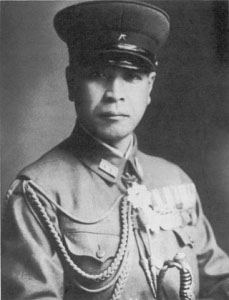![]() The Pacific War Online Encyclopedia
The Pacific War Online Encyclopedia
|
| Previous: Suzuki Shigeji | Table of Contents | Next: Suzuki Teiji |

U.S. Army. Via ibiblio.org
Suzuki Sosaku was born in Aichi prefecture and commissioned in the infantry in 1912. He was a war college graduate and held numerous staff positions between the wars, including a tour as resident officer in Germany. He had been on the staffs of the Kwantung Army and the Central China Expeditionary Army.
By late 1941 Suzuki was chief of staff of 25 Army and remained in this post until October 1942. Here he tangled with the notorious Tsuji Masanobu (Toland 1970):
It was the Ishihara-Tsuji clique — the personification of gekokujo ["loyal insubordination"] that brought the Japanese Army to this deplorable situation. In Malaya, Tsuji's speech and conduct were often insolent, and there was this problem of inhumane treatment of Chinese merchants, so I advised General Yamashita to punish Tsuji severely and then dismiss him. But he feigned ignorance. I tell you, so long as they exert influence on the Army it can only lead to ruin. Extermination of these poisonous insects should take precedence over all other problems.
Suzuki was back on the general staff in Tokyo with responsibility for military transport in April 1943, but in July 1944 he was back with Yamashita and 14 Area Army in the Philippines, when he was given command of 35 Army. He directed the defense of Leyte against the American invasion in October 1944.
In late 1944 Suzuki was promoted to full general, by which time his army had collapsed and the remnants had retreated into the mountains of western Leyte. On 25 December 1944 he received orders to evacuate as many troops as possible to defend the other southern Philippine islands. On 24 March 1945 he escaped to Cebu City. When the Americans landed here on 26 March 1945, he retreated into the hills, and on 14 June 1945 he attempted another escape, to Mindanao. His boats were attacked by aircraft and he was killed.
Prior to departing for Mindanao, Suzuki composed a final poem (Toland 1970):
Do not starve to death,
Go into the fields;
Even though we die bravely,
It will not stop the forward advance,
For I am the commander,
And fortunately I am still able to serve;
Give me many glories.
Toland (1070) reports that fellow officers described Suzuki "as a gentle man 'of great heart' and 'straight as bamboo.'"
| 1891
|
Born in Aichi prefecture |
|
| 1912 |
Second
lieutenant |
|
| 1933 |
Colonel |
Kwantung Army |
| 1934 |
Chief, Security Section, Kempeitai Kanto |
|
| 1935 |
Commander, 4 Regiment |
|
| 1937 |
Chief, 2 Section,
Inspectorate-General of Military Training |
|
| 1938-7-7 |
Major tgeneral |
Vice chief of staff, Central
China Expeditionary Army |
| 1939-9-4 |
Lieutenant general | Vice chief of staff, China
Expeditionary Army |
| 1940-3-9 |
Head, 3 Bureau, General Staff |
|
| 1941-9-15 |
General Staff |
|
| 1941-11-6 |
Chief of staff, 25 Army, Malaya |
|
| 1942-10-7
|
Ministry of War |
|
| 1943-4 |
Head, Transportation Department,
Ministry of War |
|
| 1943 |
Head, Shipping Transportation
Headquarters |
|
| 1944-7-26 |
Commander, 35 Army, Philippines |
|
| 1944 |
General |
|
| 1945-6-14
|
Killed in action |
References
The Pacific War Online Encyclopedia © 2007-2008, 2011 by Kent G. Budge. Index